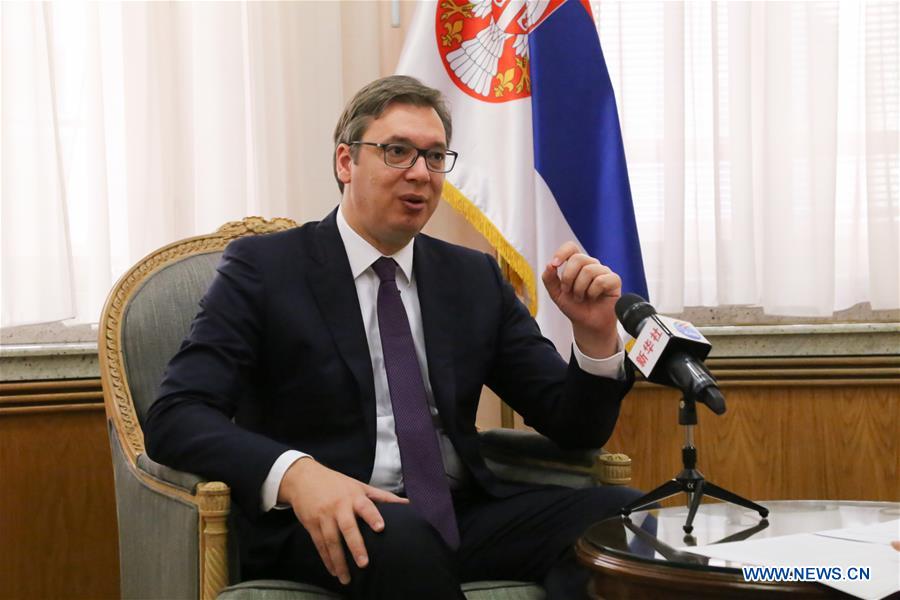
Aleksandar Vucic, Serbia's prime minister and president-elect, receives an interview with Xinhua News Agency in Belgrade, Serbia, May 10, 2017. Serbia sees the upcoming Belt and Road Forum for International Cooperation in Beijing as a chance to confirm agreed joint projects with China and to expand cooperation within the Belt and Road Initiative, Aleksandar Vucic told Xinhua in an interview. (Xinhua/Nemanja Cabric)
by Wang Huijuan
BELGRADE, May 7 (Xinhua) -- The upcoming Belt and Road forum in Beijing will be one of the most important, constructive and productive international conferences reflecting global economic changes and challenges, a Serbian expert on international relations said in a recent interview with Xinhua.
"It will demonstrate strong political will in favor of win-win cooperation, innovative, inclusive and sustainable development, as well as be in favor of peace and stability," said Zivadin Jovanovic, founder and president of the Belgrade Forum for a World of Equals and the Silk Road Connectivity Research Center, two NGO think tanks.
Based on remarkable experiences and great achievements in Asia, Europe and Africa, the forum will certainly open new, even broader horizons for strengthening cooperation under the Belt and Road Initiative in the future, said Jovanovic, who served as Yugoslavian foreign minister from 1998 to 2000.
Highlighting organizing such a forum in the "contemporary atmosphere of various uncertainties, crises, conflicts, provocative moves and policy statements," he believed the forum initiated by China's leadership will "certainly send a unique message of reason, positive thinking and constructive acting, and will be a summit of partnership on equal footing and openness, not of protectionism and walls of any kind."
Jovanovic suggested that material and people-to-people connectivity should be strengthened, and that the initiative was a good start.
"We succeeded to know each other much better since the Belt and Road Initiative started, but there is a need to intensify exchanges and cooperation in education, science, culture, think tanks, civic association, mass media, sports and tourism," he said.
He believed that openness, equality, mutual respect and cooperation without any political preconditions are what set the Belt and Road Initiative apart from others.
Jovanovic praised the cooperation between China and Serbia, noting that the bilateral cooperation under the Belt and Road Initiative "is an excellent and inspiring example of great achievements of win-win cooperation."
He listed many "firsts" among the achievements -- for example, Pupin Bridge over the Danube in Belgrade is the first Chinese-built bridge in Europe; Hesteel Serbia in the city of Smederevo is the first Chinese steel plant in Europe; and Serbia is the first country in Europe which has actually abolished visas for visitors from China.
Jovanovic said that the Chinese companies involved in these projects and many others helped strengthen the connectivity potential of Serbia as a crossroad of European and transcontinental highways and railways.
On the challenges of current and future Serbian-Chinese cooperation, Jovanovic believed that the first and utmost challenge was "how to maintain and further enhance such a pace and scope of bilateral cooperation within the framework of the Belt and Road Initiative."
The historic state visit of Chinese President Xi Jinping to Serbia in June 2016 "has broadened perspectives and reinforced the foundation for win-win cooperation in the 21st century," the expert said.
Looking forward, Jovanovic regarded the "modernization of infrastructure" and "people-to-people connectivity" as the top priorities for future Serbia-China cooperation under the Belt and Road Initiative.
"Considering the comprehensive strategic character of relations between our two countries, profound mutual trust and strong political will, I'm convinced that this cooperation will continue to grow and embrace new areas in infrastructure, industry, food production and others," he said.




